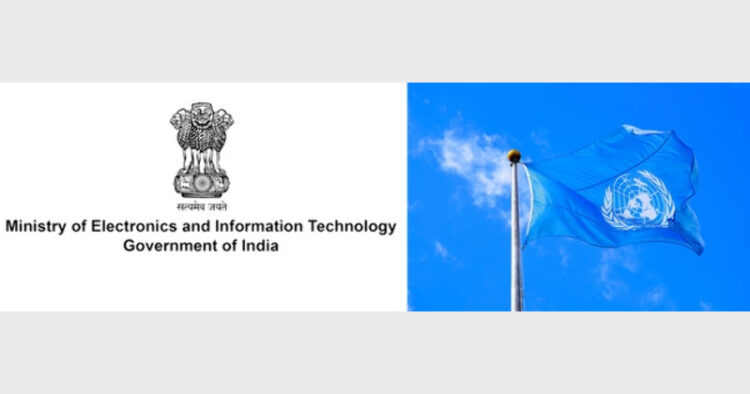New Delhi: India's permanent mission at the United Nations has clarified that India's new IT rules are "designed to empower ordinary users of social media" and that they were finalized after the government held broad consultations with civil society and other stakeholders in 2018.
India's mission at the UN has in a letter responding to concerns raised by three rapporteurs of the Special Procedures Branch of the Human Rights Council in a communication sent to the government on June 11 this year, the Ministry of Electronics and IT (MeitY) on Sunday in a statement today.
The Indian government told the UN that it had framed the Information Technology (Intermediary Guidelines and Digital Media Ethics Code) Rules, 2021 ('new IT Rules'), and notified the same on February 25, 2021. The Rules have come into effect from May 26, 2021.
It said that "The Rules are designed to empower ordinary users of social media. The victims of abuse on social media platforms shall have a forum for redressal of their grievances. The IT rules were finalized after due discussion with various stakeholders."
The enactment of new IT Rules, wrote the government, had become necessary because of widespread concerns about issues relating to increased instances of abuse of social media and digital platforms, including inducement for recruitment of terrorists, circulation of obscene content, the spread of disharmony, financial frauds, incitement of violence, public order, etc.
The letter to the UN explained that the Ministry of Electronics and Information Technology and Ministry of Information and Broadcasting undertook broad consultations in 2018 with various stakeholders, including individuals, civil society, industry association, and organizations, and invited public comments to prepare the draft Rules. Thereafter, an inter-ministerial meeting had discussed the comments received and, the Rules were finalized.
"The concerns alleging potential implications for freedom of expression that the new IT Rules will entail is highly misplaced," the government wrote. India's democratic credentials are well recognized. The right to freedom of speech and expression is guaranteed under the Indian Constitution. The independent judiciary and a robust media are part of India's democratic structure, it said.
"On the traceability of the first originator of the information, it may be noted that the new IT Rules seek only limited information. Only when a message already in public circulation is giving rise to violence, impinging on the unity and integrity of India, depicting a woman in a bad light, or sexual abuse of a child and when no other intrusive options are working, only then the significant social media intermediary will be required to disclose as to who started the message," the government wrote in its response to the UN letter.
Several social media platforms, which use end-to-end encryption technology to ensure user privacy, have argued that they will have to read, track and trace all user messages to trace the first originator of the offensive texts.
"The concern that the Rules may be misused deliberately to make many complaints to overwhelm the grievance redressal mechanisms created by social media platforms is also misplaced, exaggerated and disingenuous and shows lack of willingness to address the grievances of the users of these media platforms while using their data to earn revenues," the government said.
India said it fully recognizes and respects the right of privacy, as pronounced by the Supreme Court of India in K.S. Puttusamy case. Privacy is the core element of an individual's existence and, considering this, the new IT Rules seeks information only on a message that is already in circulation that resulted in an offense.
The Rules, said the government, have framed in exercise of the statutory powers of the IT Act, fully considering the principles of reasonableness and proportionality.
(ANI)














Comments